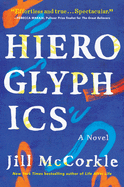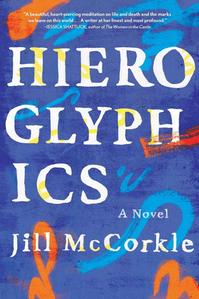
 Early loss, and how it reverberates for decades in the lives of those who experience it, is the subject of Jill McCorkle's pensive Hieroglyphics. Demonstrating her widely recognized skill at creating memorable stories out of the stuff of daily life, McCorkle's empathy for a quartet of unassuming but appealing characters provides the foundation for a novel whose drama is modest, but whose insight is deep.
Early loss, and how it reverberates for decades in the lives of those who experience it, is the subject of Jill McCorkle's pensive Hieroglyphics. Demonstrating her widely recognized skill at creating memorable stories out of the stuff of daily life, McCorkle's empathy for a quartet of unassuming but appealing characters provides the foundation for a novel whose drama is modest, but whose insight is deep.
After more than 60 years of marriage, octogenarians Lil and Frank Wishart abandon their lifelong home in Massachusetts to move to Southern Pines, N.C., to be close to their daughter. Frank, a retired college professor with a particular interest in ancient burial practices, and Lillian, who ran a dance studio, are united by tragedy. In Lil's case, it's the death of her mother in the fire at Boston's Cocoanut Grove night club in November 1942 that claimed 492 victims, when Lil was 10. Frank suffered the loss of a parent at the same age: his father was killed in a December 1943 train accident--another real-life event--not far from where the Wisharts now live. Their grandson jokes that the pair could have met on a website called "Morbidity Match."
Shelley Lassiter and her six-year-old son, Harvey, round out the foursome of characters from whose points of view McCorkle (Life After Life) tells her story. Abandoned by Harvey's father, Shelley works as a court reporter in Southern Pines, and finds herself in the midst of the trial of a prominent local physician accused of the murder of a young woman whose story feels uncomfortably close to Shelley's own. Harvey, born with a cleft lip, is a sweet boy who has developed a fascination with murderers like Lizzie Borden and the Menendez brothers, and who insists to Shelley that their house--the same one where Frank went to live after his father's death--is haunted.
McCorkle unobtrusively braids the stories of these characters, gently revealing how the traumas of Lillian and Frank's early lives indelibly shaped their perspective on the world, while subtly connecting Frank's story--through his persistent desire to revisit his old house, almost haunting it as a ghost--with that of Shelley and Harvey. In journal entries and letters to her two children, Lillian tries to erect a bulwark against her failing memory, in the process excavating--in an echo of the archeological research Frank so cherishes--the painful memory of his long-ago affair.
Jill McCorkle is an unfussy writer whose storytelling skill almost gives the impression she's simply eavesdropping on her character's lives. It's that quiet talent that makes Hieroglyphics a novel whose appeal will only enlarge in the reader's mind with the passage of time. --Harvey Freedenberg, freelance reviewer
Shelf Talker: A quiet yet revelatory exploration of how people persist in the face of tragic loss.

